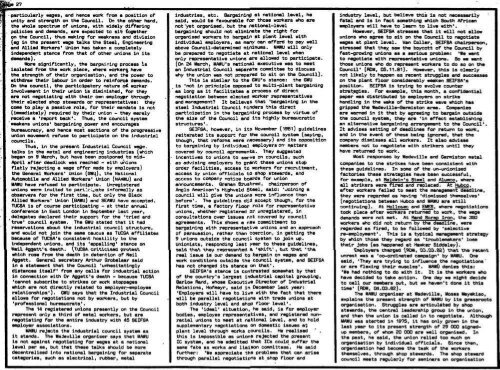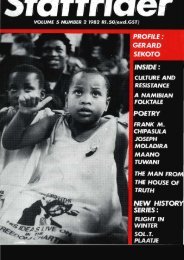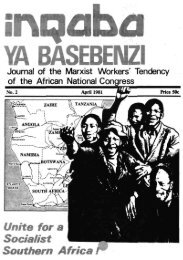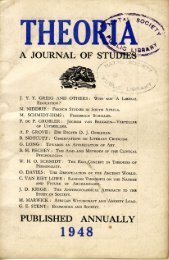Create successful ePaper yourself
Turn your PDF publications into a flip-book with our unique Google optimized e-Paper software.
particularly •egaa, end hence wort from « position of<br />
unity end strength on the Council. On the other hand.<br />
the -hoi* spectrum of unions, with widely difVering<br />
policial and demands, ara expected to ait together<br />
on the Council, thus awaking for weakneee and division<br />
(eg In tha prasant wags talks ths Steel, Engineering<br />
and Allied Sorters' Union has taken a completely<br />
independent stanca from that of othar unlona in its<br />
demands).<br />
Kore significantly, tha barfMiring procass Is<br />
isolated from tha work place, where workers hava<br />
tha strength of ttiair organisation, and tha poaar to<br />
withdraw their labour in order to reinforce demands.<br />
On tha council, tha participatory natura c4 mortar<br />
involvement in thair union is diminished* for they<br />
ara not negotiating «ith thair own employer through<br />
thair alactad ahop stawards or raprasantatlvas: thay<br />
COM to play a poaslva role, for thair aandata is not<br />
(lawjedletely) required by thair union - thay merely<br />
receive a 'report back*. Thus, tha council systaa<br />
weakens unions' bargaining power snd encourages<br />
buraaucracy, and hanca aost sections of tha prograsaiva<br />
union movement rafuaa to participate on tha industrial<br />
councils.<br />
Thus, in tha prasant Industrial Council sag*.<br />
talks in tha metal and engineering industriaa (ahich<br />
bagan on 9 Uerch, but hava baan postponed to aid-<br />
April aftar daadlock was raachad - with unlona<br />
flatly rejecting a waga offer made by aaployars)<br />
tha General Workers 1 Union (GHUh tha National<br />
Automobile and Allied sorters* Union (NAWu) and<br />
UMVU hava rafusad to partlclpata. Unragistarad<br />
unions wara invltad to partlclpata informally as<br />
obsarvara for tha firat time, but only tha Black<br />
Alllad (tartars' Union (Bflflj) and SEM-J hava accepted,<br />
TUC8A is of coursa participating - at thair annual<br />
confaranca In East London in September last yaar,<br />
delegates declared thair support for tha 'triad and<br />
trus" council systaa. Tha GVU statad that it had<br />
rasarvatlons about tha industrial council structure»<br />
mrtd would not join tha asm caucus as TUCSA affiliates<br />
bacausa of TUCSA's conslstant hostility to tha<br />
independent unlona. and its 'appalling* stanca on<br />
Nail Aggett'e daath. (TUCSA criticlsad protaat<br />
which roaa froa tha daath in datantlon of Nail<br />
Aggett. Central secretary Arthur Grace1oar said<br />
in a etatamant that tha Council 'unhesitatingly<br />
distancas itaalf * froa wny calls for industrial action<br />
in connaction with Dr Aggatt'a daath - bacausa TUCSA<br />
'cannot aubscrlba to atrikss or work stoppagas<br />
which ara not dlractly related to aanioyar-aaployaa<br />
ralatlonahipa*)- G*U **Y» that tha Industrial Council<br />
allows for nagotlatlons not by workers, but by<br />
'professional bureaucrats*.<br />
Tha 14 registered unions prasantly on tha Council<br />
raprasant only a third of metal workers, but ara<br />
negotiating for tha entire Industry with 45 SEIFSA<br />
employer associations.<br />
UAwXI rejects the industrial council systaa) as<br />
i it atends. Tha VaJeville organiser says that UAtu<br />
ia not agalnat negotiating for sagaa at a national<br />
level par aa, but that these talks should be more<br />
dacentralieed into national bargaining for separata<br />
categories, such as electrical, rubber, natal<br />
industries, ate- Bargaining st national level, ha<br />
said, would be favourable for those sorters who ara<br />
not 'yet organised, but tha national-level<br />
bargaining should not eliminate tha right for<br />
organised wortere to bargain at plant level with<br />
individual aaployars, as many can afford to pay wall<br />
above Council-determined minimum*. *tAHU -ill only<br />
be prepared to negotiate at national level when<br />
only representative unions are allowed to participate.<br />
(On 24 March, eVWJ'e national executive was to ejeet<br />
an Industrial Council eepanate committee to discuss<br />
why the union was not prepared to sit on tha Council).<br />
Thle is similar to tha GaTU's stance: tha GaV<br />
la 'not in principle opposed to multi-plant bargaining<br />
aa long as it facilitates a procass of direct<br />
negotiation between elected sorter representatives<br />
and management? It believet that 'bargaining in tha<br />
ateal Industrial Council hinders this direct<br />
participation in tha bargaining procass by virtue of<br />
the size of the Council and its highly bureaucratic<br />
etructures'.<br />
SEIF6A, however, in its Iwjvember (1961) guidelines<br />
reitereted its support for the council systaa (eaying,<br />
though, that reforms wara necessary) and its opposition<br />
to bargaining by Individual efnployers on- aatters<br />
covered by council agreements. They suggested<br />
incentives to unions to serve on councils» such<br />
as advising aaployars to grant these unlona atop<br />
order facilities, accaaa to workers for recruitment,<br />
eccaas by union officiala to ahop stawards, end<br />
access to company notice boards for union<br />
announcaaants. Graham Bruatred, chairperson of<br />
Anglo American's Hlghveld Stsel, said: 'Joining a<br />
council will give tha unions •ore influence than<br />
before'. The guldelinee did accept though, for the<br />
first tJjat, a factory floor role for representative<br />
unions, whether registered or unregietered, in<br />
consultations over Issues not covered by council<br />
agreements. This shoes a new ccaeaittaent to<br />
bargaining with representstl^t unions and an approach<br />
of persuasion, rather than coercion, in getting the<br />
9 unions outaide tha council system to Join up.<br />
Unionists, responding last yaar to these guldelinee,<br />
said that thay represented • 'shift 4 , but that *the<br />
real issue is our demand to bargain on wagea and<br />
wort conditions outside tha council systaa, and 9EIFSA<br />
has not changed its stance on that*.<br />
SEIFSA'e stanca is contrasted somewhat by that<br />
of the country's largest industrial capital grouping,<br />
Barlow Rand, whose Executive Director of Industrial<br />
Relatione, Hofeeyr, aaid in December last yeart<br />
'Employers will have to llva with tha fact that there<br />
will be parallel negotiations with trada unions st<br />
both industry level and ehoP floor level*.<br />
The 'ideal' situation, ha aaid, is for aaployer<br />
bodies, employee representatives, and registered nonracial<br />
unlona to aaet at national level, and to hold<br />
aupplementary negotiations on domestic Issues at<br />
plant level through worts councils. Hs realised<br />
this Is impossible as unions rejected the present<br />
XC system, and ha admitted that ICa could suffer tha<br />
same fate es works and liaison committees. He aaid<br />
further: '•» appreciate the problems that can arise<br />
through parallel negotietione at shop floor and<br />
industry level, but believe thle is not necessarily<br />
fatal and is in fact something which South African<br />
amployera will have to learn to llva with 1 *<br />
However, StIFSA etreeaas that it will not allow<br />
unions who agree to sit on tha Council to negotiate<br />
wages at plant level. Van Collar, SEIF8A chairperaon,<br />
stressed that thay earn tha boycott of the Council by<br />
feet-growing unions aa a serious problem 'i"a want<br />
to negotiate with rapraaentatlva unlona. So aa aant<br />
thoee unlona who do represent wortere to do so on tha<br />
Council* (RDM, 05.11.61)* However, thle is clearly<br />
not likely to happen as recant atrugglas and eucceases<br />
on tha plant floor considarably weaken SEIFSA'a<br />
position, SCIF6A la trying to evolve counter<br />
strategies. For example, thle month, a confidential<br />
paper was distributed to aaployars on etrlke<br />
handling in tha wake of the etrlke wave which haa<br />
gripped the tadavilla-Garnlston area. Companies<br />
era warned in it that by agreeing to bargain outaide<br />
the council system, thay ara 'in affect establishing<br />
an alternative bargaining arrangement to tha Council*.<br />
It edvlees setting of deadlines for return to wort,<br />
and in tha event of these being ignored, that tha<br />
company dismissal all wortere* It also advises<br />
members not to negotiate with strikers until thay<br />
have returned to wort.<br />
stoat responses by wadevllle and Germlston aatal<br />
companies to the strikes have bean consietent with<br />
theae guidelines. In aoaa of the un-unionised<br />
factories these strategies have been successful,<br />
for example, at Baldwin's Steal and Alumco. where<br />
all strikers were fired and replaced. At hubco.<br />
after workers failed to meat the management deadline,<br />
thay wars regarded as having 'dismissed themselves'<br />
(nagotiatione between Hubco and avwj ara still<br />
continuing). At Hpllosec and EMJETS, where nagotietions<br />
took place after workers returned to wort, tha wage<br />
demands were not eat. At ftand Scrap Iron, tha 350<br />
workers who did not return by the deadline, were<br />
regarded aa fired, to be followed by 'selective<br />
re-employment'. Thle is a typical mnevsment strategy<br />
by which those thay regard aa "troublemakers' lose<br />
thair Jobe (as happened at Hawker Siddoley}.<br />
Employers charged (ROU, 03.03.82) that tha recant<br />
unreat was a *co-ordinated campaign 1 by UAau. One<br />
said, *Thay era trying to influence the negotiations +<br />
or ara flexing their muaclee'* mWrG denies this:<br />
'few had nothing to do with It. It la tha aortara aho<br />
have decided to take action. One day wa might decide<br />
to call our saabers out, but wa haven*t dona it thle<br />
tiag* (ROM, 04.03.62)*<br />
Tha MAWU organiser at aadeville, Hoses esiyekleo.<br />
explains tha present strength of MAVU by its grassroots<br />
organisation. Struggles ara articulated by ahop<br />
stewards, tha central leadership group in tha union,<br />
and than tha union is called in to negotiate. Although<br />
UMU was started in 1995, it has only grown in the<br />
lest year to its present strength of 29 000 signedup<br />
members, of whom 20 000 are wall organised. In<br />
the peat, ha said, tha union relied too much on<br />
organisation by individual officiala. Since than,<br />
orgeniaation had become the task of tha mortars<br />
themselves, through shop stewards. The ahop ataward<br />
council meats regularly for seminars on orgeniaation

















